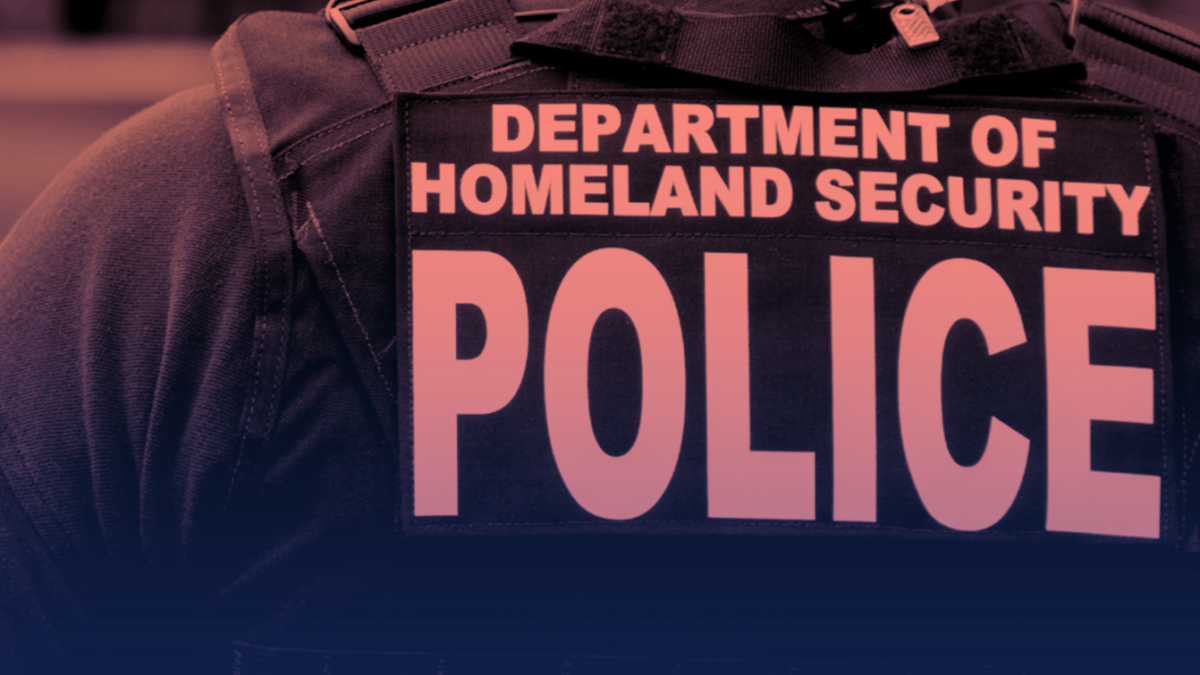Christine Kwon focuses on legal and policy advocacy to stop and seek accountability for abuses of power and those who undermine democracy.
Legal Challenges to Improper Deployment of Homeland Security Forces: An Explainer
- August 1, 2020

President Trump has long sought to have a militarized police force under his direct control. Since facing resistance at the Pentagon when he threatened to deploy active-duty troops to quell protests, and from the National Guard when he involved them in tear-gassing peaceful protesters at Lafayette Square in DC, President Trump has turned to the Department of Homeland Security to fill that role. In July, through a mission dubbed “Operation Diligent Valor,” the administration deployed unidentified DHS agents to Portland, Oregon to forcibly suppress protesters exercising their constitutional rights. The agents indiscriminately deployed tear gas, flash-bang explosives, and other munitions to disperse crowds; and arrested protesters in unmarked vans. The president warned, “We very much quelled it, and if it starts again, we’ll quell it again very easily. It’s not hard to do, if you know what you’re doing.”
The purported authority for Operation Diligent Valor is 40 U.S.C. § 1315, which permits the Secretary of Homeland Security to designate DHS agents to protect federal property. It does not authorize a roving secret police or the use of excessive crowd control measures. The Trump administration’s abuse of this statutory power follows a pattern of exceeding the limits of executive power as we approach the election. There is a strong possibility that more American
cities, namely those that the Trump administration views as the “radical left,” will see the incursion of militarized federal forces in the coming months, perhaps particularly in the event of a disputed election.
President Trump’s unlawful use of DHS forces is subject to legal challenge in
court. Protect Democracy has analyzed claims against DHS for:
- exceeding its power to protect federal property;
- violating the constitutional rights of protesters;
- violating the Appointments Clause, Federal Vacancies Reform Act, and DHS succession
statute; and - violating the Administrative Procedure Act through all of the above.
Legal Framework. In our constitutional system, the president has only the powers granted to him by the Constitution and Congress. He does not have any inherent authority to command a standing force of armed civilian agents. In addition, the Tenth Amendment reserves to the states all powers that the Constitution does not otherwise delegate to the federal government,
including a generalized police power. Thus, the president can deploy federal agents to serve as law enforcement only when it is authorized by statute. Section 1315 of Title 40 of the U.S. Code authorizes the Department of Homeland Security to deploy DHS agents “for duty in connection with the protection of [federal] property…including duty in areas outside the property”—but
only “to the extent necessary to protect the property and persons on the property.” 40 U.S.C. § 1315(b)(1). This power cannot be used to deploy a generalized police force or to violate protesters’ constitutional rights.
Legal Claims. The Trump administration’s use of DHS agents under 40 U.S.C. § 1315 to quell protests violates federal statutes and the Constitution.
First, DHS cannot exceed its statutory authority, and actions taken in excess of its statutory authority are ultra vires.
Section 1315 authorizes the DHS secretary to deploy law enforcement agents only for the purpose of protecting federal property. The president and his administration cannot invoke the statute to order DHS agents to instead pursue a policy of cracking down on protesters regardless of whether they pose any threat to federal property. In Portland, for example, the Trump
administration deployed DHS agents under the pretext of protecting federal property, but agents’ conduct clearly and intentionally exceeded “the extent necessary” to protect federal property and persons on that property. That makes their actions—and DHS’s policy of deploying these agents in this manner—illegal.
Second, DHS cannot violate the Constitution, regardless of the statutory authority it relies on.
First Amendment. The First Amendment protects the right of protesters to peacefully assemble and protest, and to be free from unlawful retaliation. A policy of “quelling” protests because of the views being expressed would certainly violate the First Amendment. Both the agents’ conduct and statements from President Trump and other federal officials could be evidence of such a policy. Moreover, arrests or the use of force made because of a protester’s
political views would violate the First Amendment (and possibly the Fourth Amendment). Individuals who are deterred from protesting because of the threat of arrest or injury would also have a claim that their First Amendment rights were violated.
Fourth Amendment. The use of excessive force to break up peaceful protests also violates protesters’ Fourth Amendment rights. The Fourth Amendment is not limited to literal seizures of persons and property. Courts have long held that dispersing a crowd with excessive force—including the use of pepper spray, tear gas, and munitions—constitutes an unreasonable seizure. The force used on a crowd must be, in the court’s view, objectively reasonable. Shock-and-awe military-style tactics, like those employed by this administration, give rise to
strong Fourth Amendment claims. Moreover, warrantless arrests without probable cause—like the high-profile arrests made in Portland by unidentified agents in unmarked vans—are a classic Fourth Amendment violation.
Fifth Amendment. Aggressive, military-style unjustified use of force can also violate a protester’s Fifth Amendment right to due process. Individuals are protected from arbitrary uses of force that are not justified by a sufficient government interest. Myriad factors are weighed in judging a due process violation, such as the amount and need of force; the extent of injuries;
attempts by the government to limit those injuries; the perceived threat by the government; and whether a plaintiff is actively resisting.
Third, actions taken by unlawfully appointed DHS leaders are void.
Under § 1315, only the Secretary of Homeland Security is authorized to designate DHS employees to supplement the Federal Protective Services in protecting federal property. But the purported acting secretary, Chad Wolf, is serving in his position unlawfully, and therefore any such designations are void. The Constitution’s Appointments Clause requires that high-ranking “principal” government officers, including the Secretary of DHS and other agency leaders, serve in their positions only with Senate approval. But Wolf, as well as many other high-ranking DHS officials, has never been confirmed by the Senate to that post. Wolf is also not lawfully serving under either the DHS succession statute, 6 U.S.C. § 113, or the Federal Vacancies Reform Act, which specify who should serve as Acting Secretary of Homeland Security when the post is vacant. As a result, he has no legal claim to his office; the actions he takes while purporting to
exercise the authority of that position in violation of the Constitution and statutory authority are void and must be set aside.
Statutory and constitutional violations render agency actions invalid under the
Administrative Procedure Act.
DHS actions that give rise to constitutional or statutory claims also, separately, violate the APA. The APA creates an explicit cause of action for challenging an agency action or policy that exceeds the agency’s statutory or constitutional authority. Specifically, the APA requires that courts “hold unlawful and set aside agency action” that is arbitrary, capricious, or contrary to law—including both statutory law and the constitution. 5 U.S.C. § 706(2)(A)–(C). Therefore, when DHS violates the First, Fourth, and Fifth Amendments; exceeds its authority under 40 U.S.C. § 1315; and acts under the authority of unlawfully serving leadership, it violates the APA as well.
The APA claim for a violation of 40 U.S.C. § 1315 will be strongest when the facts clearly demonstrate that DHS’s policy authorizes actions beyond what is “necessary” to protect the federal property and persons on the property. If DHS does not have adequate reasons for its actions, then its actions are arbitrary and capricious. In the protest context, strong claims will show that DHS is not concerned with protecting federal property, but rather with displaying force against a peaceful assembly; and that the federal property interest was a pretext all along. The president’s Twitter account and DHS officials’ public statements may be sources of evidence that their intent went beyond the protection of federal property.
DHS’s actions would also be contrary to law, and thus a violation of the APA, if it exceeds the congressional grant of authority under § 1315. Congress has not authorized the agency to quell speech the president dislikes or to—in the president’s words—generally “restore order.” Indeed, in authorizing DHS to protect federal property, Congress derived its own authority from the Property Clause of the Constitution, which limits Congress’s power to “needful Rules and Regulations” concerning federal property. Since Congress’s power is itself bound to actions with respect to federal property, it could not give DHS broader powers even if it wanted to. Any DHS forces acting under 40 U.S.C. § 1315 who aren’t solely protecting federal property are therefore acting contrary to law and violating the APA.
Even simpler is the APA violation that arises from infringing constitutional rights. If DHS deploys federal agents pursuant to a policy of violating the First, Fourth, and Fifth Amendments, that policy is “contrary to constitutional right,” and must be separately prohibited under the APA. 5 U.S.C. § 706(2)(B).
When the president uses Department of Homeland Security agents as his personal palace guard, there are overlapping remedies in our laws and in the Constitution. It is ominous that he has deprived the Department of Senate-confirmed leadership while misusing its power against far-flung protests. When he does, keeping a careful account of events will help sort through the intentional chaos and lay the groundwork for your legal claims.
Download the full report Download the full report
Related Content
It can happen here.
We can stop it.
Defeating authoritarianism is going to take all of us. Everyone and every institution has a role to play. Together, we can protect democracy.
Donate
Sign Up for Updates Sign Up for Updates
Explore Careers Explore Careers
How to Protect Democracy How to Protect Democracy


